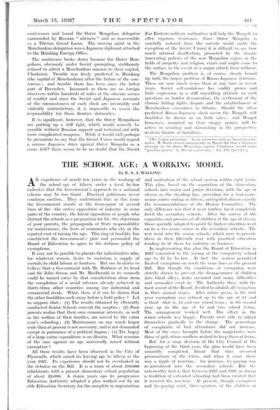WHERE JAPAN AND RUSSIA CLASH
By WILLIAM HENRY CHAMBERLIN
Tokyo IT is not an accidental coincidence that sonic of the severest clashes on the uneasy northern frontier of Manchoukuo have taken place along the ill-defined bound- ary between Manchoukuo and Outer Mongolia. Skirmish- ing started on this border shortly before Christmas and has never entirely died down. The highly contradictory communiques that were issued from Japanese and Soviet sources when more serious fighting broke out in the middle of February agreed on only one point : that larger forces were steadily becoming involved and that more formidable weapons than the rifles and machine-guns with which a frontier post would normally he equipped were being used. The Japanese Press reported the fact that two Soviet aeroplanes participated in an engagement at Olahodka on February 12th, where eight Japanese were killed and eleven Japanese and Manchoukuo soldiers were wounded. Several Soviet statements have men- tioned the appearance of armoured cars and trucks on the Japanese-Manchoukuo side.
Mongolia is a pivotal problem for Japanese and for Soviet strategy. Until and unless the present state of armed tension between Japan and the Soviet Union gives way to sonic kind of understanding and appeasement the frontiers of the Mongolian areas which arc under the direct or indirect control of the two Powers are likely to be especially disturbed. Vast in area, sparse in popula- tion and natural resources, the lands occupied by the Mongols lie directly across the pathways which seem marked out for Japanese and for Soviet expansion. At the present time these lands are divided. It is probably inevitable that the more ambitious spirits both on the Soviet and on the Japanese sides of the dimly-indicated line of demarcation should try to exploit their own Mongols as a nucleus for propaganda and perhaps eventual advance into the Mongolian territory held by the other Power.
A number of officers of the Kwantung Army (Japan's military force in Manchoukuo), notably Lieutenant- Colonel Terada, have become specialists in the Mongolian question, learning the language, becoming familiar with the religion and customs of the Mongols. There can be little doubt that sonic of these officers cherish dreams of a Pan-Mongolian State, protected by Japan, purged of any Bolshevik influence and based on the ancestral tribal customs and the lamaism (a kind of corrupted Buddhism) which has long been the dominant religion in Mongolia. Outer Mongolia would be an integral part of any such State; and it is quite conceivable that the Japanese military authorities would be willing to consent to an adminis- trative detachment from Manchoukuo of the Mongolian provinces which lie to the west of the Hsingan Mountains, provided, of course, that Japanese influence on the hypothetical new Mongolian State was assured and unchallenged. The Soviet Union, on the other hand, regards Outer Mongolia, where a puppet state, under Soviet influence, was set up with the aid of the Red Army in 1921 as a valuable outpost in the Far East, which it does not propose to abandon. Outer Mongolia, so long as it preserves its Soviet orientation, is a potentially useful. military corridor, through which Soviet cavalry and motorised units could strike into the western part of Man- choukuo, threatening the communications of the Japanese armies on the Amur, Ussuri and Argun rivers on the northern boundary of Manchoukuo.
The loss of Outer Mongolia would lay bare a thousand miles of Siberian frontier and make more difficult the already complicated task of defending the Soviet Far Eastern provinces, which lie thousands of miles away from the country's main centres of industry and popu- lation. A Japanese air base in Ulanbator, the capital of Outer Mongolia, might even threaten the large iron, steel and machine building works which have grown up in Novosibirsk and Kuznetzk, in Central Siberia, and which would certainly be turned to military uses in the event of war.
.There has been an appreciable growth of Japanese influence in Inner Mongolia during the last months. A pro-Japanese regime, apparently headed by Man- choukuo Mongols, has been set up in -southern Chahar. The Mongolian Autonomous Political Council, under the leadership of Prince Teh, has moved further in the direction of snapping the tenuous ties which bind it to Nanking. Inner Mongolia has been under a curious kind of dual government, with Chinese military and civil authorities and Mongolian princes ruling side by side, for some time. It is extremely difficult, on the basis of meagre, irregular and contradictory reports, to know the precise balance of power at any given moment. But it seems to be a reasonable prediction that Japanese military power and influence will grow, rather than diminish, in Inner Mongolia with the passing of time. A substantial increase in Japan's North China garrison is planned ; and Japanese military leaders, both in Manchoukuo and in North China, attach very great importance to Inner Mongolia, because it is through this .region that Soviet aid in propaganda, arms and money might reach the peripatetic Chinese Communists.
By contrast with Inner Mongolia, where distance and lack of means of communication are the main obstacles to effective Japanese penetration, Outer Mongolia is a distinctly harder nut to crack. Two prolonged confer- ences which were held at the Manchoukuo border town of Manchouli last year failed to lead to any agreement between Manchoukuo and Outer Mongolia on such questions as frontier delimitation and ex- change of diplomatic representatives. I was present in Manchouli for a short time during one of these, conferences and found the Outer Mongolian delegates ,surrounded by Russian '" advisers " and as inaccessible as a Tibetan Grand Lama. The moving spirit in the .Manchoukuo delegation was a Japanese diplomat attached fo the Hsinking Foreign Office.
The conference broke down because the Outer Mon- golians, obviously under Soviet prompting, stubbornly refused to admit a Manchoukuo mission to their capital, Ulanbator. Trouble was freely predicted in thinking (the capital of Manchoukuo) after the failure of the con- ference; and • trouble there has been since the latter part of December. Inasmuch as there are no foreign observers within hundreds of miles of the obscure scenes of conflict and since the Soviet and Japanese accounts of the circumstances of each clash are invariably and violently contradictory, it is impossible to assess the responsibility for these frontier skirmishes.
It is significant, however, that the Outer Mongolians are putting up a stiff fight, which would scarcely be possible without Russian support and technical aid with more complicated weapons. While it would still perhaps be premature to say that the Soviet Union would regard a serious Japanese drive against Outer Mongolia as a cavis kill* there seems to be no doubt that the Soviet ;Far- Eastern military authorities will help the Mongols to offer Vigorous r(,istance. Since Outer Mongolia is carefully isolated from the outside world (with the exception of the Soviet Union) it is difficult to say how much- internal disaffectiOn, promoted by the drastic innovating policies of the new Mongolian reg,inie in the fields of property and religion, exists and might come to the surface in the event of a major attack from without.
The Mongolian problem is, of course, closely bound 'up with the larger problem of Russo-Japanese relations. These are now much worse than at any time in recent years. Soviet self-confidence has visibly grown and finds expression in a stiff unyielding attitude on such questions as border demarcation, the settlement of the chronic fishing rights dispute and the establishment or Manchoukuo consulate-s in Siberia. Should the often predicted Russo-Japanese clash occur the Mongols will doubtless be drawn in on both sides ; and Mongol horsemen, mounted on their shaggy ponies. will be active in scouting and skirmishing in the prospective western theatre of hostilities.
*[No longer premature. lu an interview with an American jour- nalist, M. Stalin stated eategorically nit March fit h that a Japanese attempt on the Outer Mongolian capital. Ulanhatur, would ku "positive action" by Russia a necessity.—Eu. The .Spechitoni















































 Previous page
Previous page